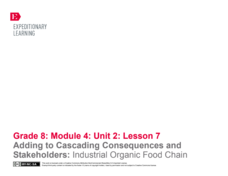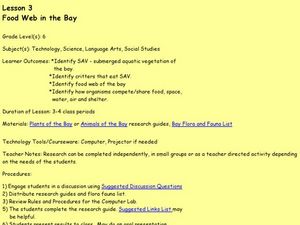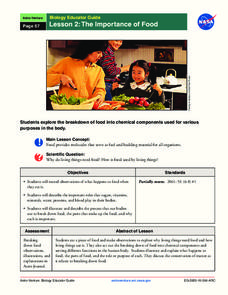EngageNY
Determining Cascading Consequences Using The Omnivore’s Dilemma: Industrial Organic Food Chain
Organic versus conventional farming: which option is best? Pupils use Michael Pollan's The Omnivore's Dilemma to determine the cascading consequences of the industrial organic food chain. They work in research teams to create an...
EngageNY
Using Search Terms for Further Research: Industrial Organic Food Chain
Class members conduct independent research to continue examining the consequences of the industrial organic food chain from Michael Pollan's The Omnivore's Dilemma. Pupils learn about source credibility and effective search terms, then...
EngageNY
Adding to Cascading Consequences and Stakeholders: Industrial Organic Food Chain
Researchers continue determining the effects of the industrial organic food chain that Michael Pollan describes in The Omnivore's Dilemma. In teams, pupils add to their Cascading Consequences charts and complete Stakeholders charts based...
Baylor College
Food Webs
Explore various ecosystems from around the world as your class discovers the interdependence of all living things. Using the provided sets of ecosystem cards, young scientists work in small groups building food webs to demonstrate the...
Curated OER
Pesticide Watch Card
Students examine human health by identifying dangerous pesticides. In this agriculture instructional activity, students research the food production system in the United States and discuss dangers such as pesticides, chemicals and...
Curated OER
Discovering Local Food Chains
Fourth graders study about food chains. With the assistance of a local biologist, Students hike the school trail system. They explore ecosystem and collect data by charting the organisms found and identifying the energy source. They...
University of Georgia
Energy Content of Foods
Why do athletes load up on carbohydrates the evening before a competition? The lesson helps answer this question as it relates the type of food to the amount of energy it contains. After a discussion, scholars perform an experiment...
EngageNY
Writing a Position Speech: Which Food Chain Would Be Best?
Eeny, meany, miny, moe. It's time to choose a side. Scholars learn about taking a position by watching a video of a speech about local organic food. Next, pupils use graphic organizers to plan their speeches about which food chain is...
World Wildlife Fund
Arctic Food Chain
Explore the food chains that support Arctic ecosystems. A class discussion on interdependence and the different roles plants and animals play in ecosystems provides students with the knowledge to complete a worksheet asking them to...
Curated OER
Food Pyramid Relay Race
Students explore healthy eating habits by conducting a physical food challenge. In this food pyramid instructional activity, students identify the main concepts behind the food pyramid and what choices they should be making with their...
University of Georgia
Flavor of Organic Chemistry
Introduce organic chemistry through an analysis of flavor. A three-part unit begins with an overview of the components of flavor. Next, scholars prepare esters through esterification. Finally, they examine how all senses have an impact...
EngageNY
Reading for Gist, Answering Text-Dependent Questions, and Determining Author’s Purpose: Industrial Organic Food Chain
After re-reading The Omnivore’s Dilemma using a Reading Closely: Guiding Questions handout, class members use sticky notes to annotate and determine the gist of the text. Finally, they use an Author’s Purpose graphic organizer to...
Virginia Department of Education
Freshwater Food Chains
What's in the water? Encourage your class to further explore this question and learn about pond ecosystems, food chains, and food webs as they complete this hands-on activity. They view the environment from a new perspective...
Curated OER
Food Chains
Learners take a look at the relationship between organisms in food chains, food webs, and energy pyramids. After an opening demonstration by the teacher, pupils are split up into groups. Each one is assigned an environment such as:...
Curated OER
Where are Koalas on the Food Chain?
Take a field trip to observe Koalas, absolutely! Budding scientists become familiar with the Koala's position in the food chain. They answer questions based on what they see and draw a food chain explaining the Koalas position. Tip: A...
Curated OER
Food Web in the Bay
Sixth graders study the food web in a bay. In this food web lesson plan, 6th graders investigate the SAV- submerged aquatic vegetation of a bay including their predators, and how the organisms eat, have proper living space and water....
Curated OER
Organ Systems
Students examine organisms that are composed of tissues, organs, and systems. They dissect a fetal pig and explore the assigned organs systems such as the skeletal, muscular, and circulatory organs. Students identify and explain their...
Curated OER
What's Organic?
Students discuss background information presented by the teacher and read dictionary definitions for the words "organic" and "synthetic." In this gardengin lesson, students complete a worksheet on the material. Students grow and compare...
Curated OER
Organic and Inorganic Waste
Students conduct a scientific investigation about organic or inorganic waste. In this organic or inorganic waste lesson, students create a compost heap to determine the difference between inorganic and organic waste. Students...
Polar Trec
Bering Sea Fabulous Food Chain Game
In spring, the Bering Sea turns green due to phytoplankton, which live at the surface, experiencing a population explosion. Groups of scholars play a food chain game, writing down food chains as the game is played. After five to six...
Curated OER
Healthy Foods
Students view a video which explores the following statement. "You are what you eat." They discuss the food industry, organic foods, and healthy food choices. They chart what they eat on a daily basis and make plans for healthier options.
NASA
The Importance of Food
Pupils make observations while eating food. They act out the process of food breaking down in the body and the roles of various chemical components, such as sugar and protein. It concludes with an activity illustrating the process and a...
Captain Planet Foundation
Energy Flow in the Garden
How can you tell what an owl has eaten? Study the food chain and flow of energy in an ecosystem by dissecting an owl pellet and noting the bones found inside. Additionally, the instructional activity includes a game about consumers and...
Curated OER
The Food Pyramid
Learning about nutrition and how to eat healthy foods is very important for kids these days. Here is a lesson, designed for 4th graders, that teaches these important skills. Pupils plan nutritional meals by using the USDA's Food Guide...
Other popular searches
- Con Pair Organic Foods
- Organic Foods Taste
- Non Organic Foods
- Com Pair Organic Foods
- California Organic Foods
- Compair Organic Foods
- Conpair Organic Foods
- Organic Foods Lesson Plan























